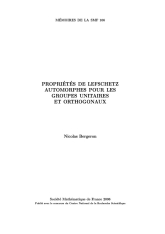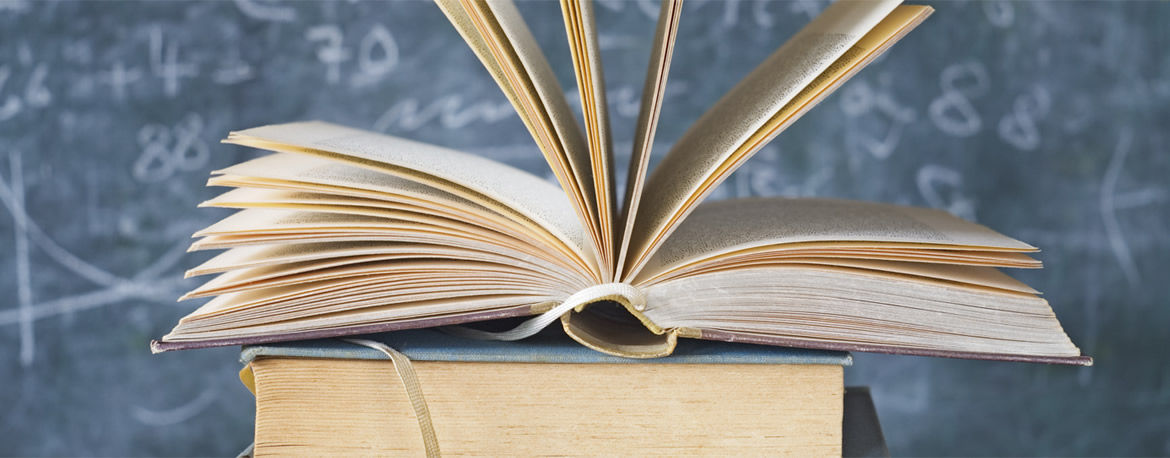Propriétés de Lefschetz automorphes pour les groupes unitaires et orthogonaux
Automorphic Lefschetz properties for unitary and orthogonal groups

- Consulter un extrait
- Année : 2006
- Tome : 106
- Format : Électronique, Papier
- Langue de l'ouvrage :
Français - Class. Math. : 11F75, 22E47, 22E55, 11G18, 14G35, 58J50
- Nb. de pages : vi+125
- ISBN : 978-2-85629-219-8
- ISSN : 0249-633-X
- DOI : 10.24033/msmf.418
Dans ce mémoire, nous démontrons et conjecturons un certain nombre de résultats reliant la cohomologie d'une variété arithmétique à la cohomologie de certaines de ses sous-variétés totalement géodésiques. Ces résultats font écho aux théorèmes de Lefschetz qui, en dehors du degré médian, permettent de réduire l'étude de la cohomologie d'une variété projective complexe à l'étude de la cohomologie d'une section hyperplane générique. Il est peut-être un peu surprenant qu'une telle analogie subsiste dans le cas des variétés arithmétiques réelles.
Résumé détaillé : Soit $S= S(\Gamma ) = \Gamma \backslash X$ une variété arithmétique obtenue comme quotient d'un espace symétrique $X=G({\Bbb R}) /K$ — $G$ étant un groupe semi-simple connexe sur $\Bbb Q$, $K \subset G({\Bbb R})$ un sous-groupe compact maximal — par un sous-groupe arithmétique $\Gamma $ de $G({\Bbb Q})$. Si $H \subset G$ est un sous-groupe semi-simple connexe tel que $H({\Bbb R}) \cap K$ soit un sous-groupe compact maximal, alors $Y = H({\Bbb R}) / H({\Bbb R}) \cap K$ est un sous-espace symétrique de $X$. Pour tout $g \in G({\Bbb Q})$ on peut former la variété arithmétique $S(H,g) = (H({\Bbb Q}) \cap g^{-1} \Gamma g) \backslash Y$ et considérer l'immersion naturelle $j_g : S(H,g) \rightarrow S$ induite par l'application $H({\Bbb A}) \rightarrow G({\Bbb A})$, $h \mapsto gh$. Supposons $G$ anisotrope ce qui implique que $S$ et $S(H,g)$ sont compactes. Alors, pour tout entier positif $k$, l'application $j_g$ induit l'application de restriction $R_g : H^ k (S,{\Bbb C}) \rightarrow H^k (S(H,g),{\Bbb C}).$ Dans ce mémoire nous nous concentrons sur le cas des espaces symétriques associés aux groupes orthogonaux et unitaires, $O(p,q)$ et $U(p,q)$ ; nous démontrons des critères explicites d'injectivité du produit (sur les $g\in G({\Bbb Q})$) des applications $R_g$ en restriction à la partie fortement primitive (au sens de Vogan et Zuckerman) de la cohomologie. Nous démontrons également des critères explicites d'injectivité de l'application $H^k (S(H) , {\Bbb C}) \rightarrow H^{k +{\rm dim}S -{\rm dim}S(H)} (S,{\Bbb C})$ duale à l'application de restriction $R_e$. Les résultats obtenus s'inscrivent naturellement dans une programme conjectural plus large que nous décrivons et auquel on peut penser comme à un analogue automorphe des théorèmes de Lefschetz classiques sur les variétés projectives. Il est peut-être un peu surprenant qu'une telle analogie subsiste dans le cas de variétés arithmétiques réelles. La démonstration consiste à réduire les problèmes globaux mentionnés ci-dessus à leurs analogues locaux à l'aide de théorèmes de Burger et Sarnak et de propriétés d'isolation des représentations cohomologiques dans le dual automorphe. Les méthodes utilisées sont alors essentiellement issues de la théorie des représentations. Finalement, nous déduisons de ces résultats des applications à la construction de classes de cohomologie non nulles dans certaines variétés arithmétiques.

